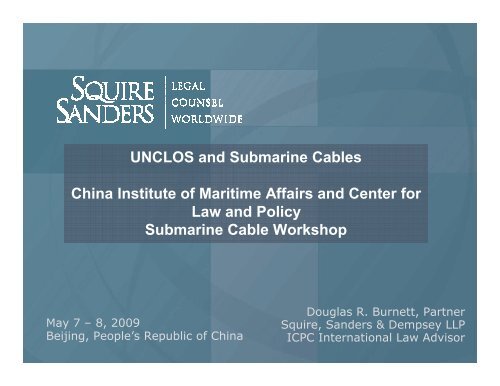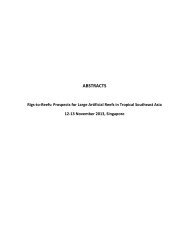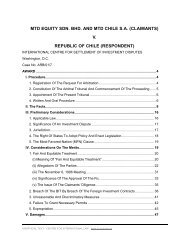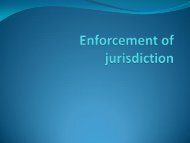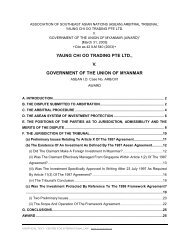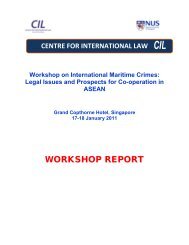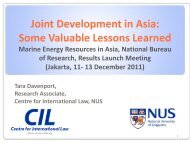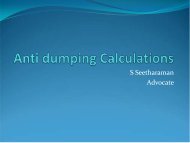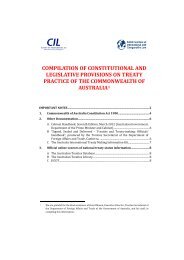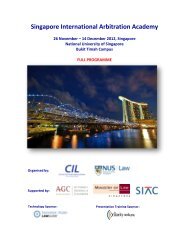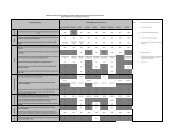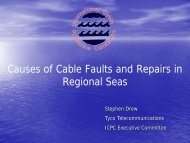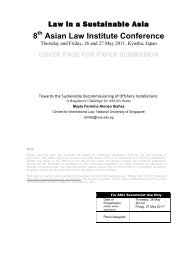UNCLOS and Submarine Cables - Centre for International Law
UNCLOS and Submarine Cables - Centre for International Law
UNCLOS and Submarine Cables - Centre for International Law
You also want an ePaper? Increase the reach of your titles
YUMPU automatically turns print PDFs into web optimized ePapers that Google loves.
<strong>UNCLOS</strong> <strong>and</strong> <strong>Submarine</strong> <strong>Cables</strong><br />
China Institute of Maritime Affairs <strong>and</strong> Center <strong>for</strong><br />
<strong>Law</strong> <strong>and</strong> Policy<br />
<strong>Submarine</strong> Cable Workshop<br />
May 7 – 8, 2009<br />
Beijing, People’s Republic of China<br />
Douglas R. Burnett, Partner<br />
Squire, S<strong>and</strong>ers & Dempsey LLP<br />
ICPC <strong>International</strong> <strong>Law</strong> Advisor
Parties to Cable Protection<br />
Treaties<br />
• 41 parties to 1884 Paris Convention<br />
• 61 parties to 1958 Shelf Convention<br />
• 64 parties to 1958 High Seas Convention<br />
• 157 parties to 1982 LOS Convention<br />
• The only countries that are party to all<br />
four treaties are Czech Republic,<br />
Denmark, Fiji, Germany, Pol<strong>and</strong>, Portugal,<br />
Romania, Russia, Slovakia, South Africa,<br />
Spain <strong>and</strong> the UK
Treaties <strong>and</strong> Agreements<br />
• 1884 <strong>Submarine</strong> <strong>Cables</strong> Convention<br />
• 1958 Continental Shelf Convention<br />
• 1958 High Seas Convention<br />
• 1972 Collision Regulations<br />
• 1982 <strong>Law</strong> of the Sea Convention<br />
• Most comprehensive is LOS Convention
1884 <strong>Submarine</strong> <strong>Cables</strong><br />
• Convention <strong>for</strong> the Protection of<br />
<strong>Submarine</strong> Telegraph <strong>Cables</strong>, Paris 14<br />
March 1884, entered into <strong>for</strong>ce 1 May 1888<br />
• 40 States Parties, Hong Kong<br />
• Significant States not Party: China,<br />
Colombia, Ecuador, Egypt, Israel, Peru,<br />
Turkey, Venezuela, Japan, Korea,<br />
Singapore
1958 Continental Shelf<br />
Convention<br />
• Convention on the Continental Shelf,<br />
Geneva 29 April 1958, entered into <strong>for</strong>ce<br />
10 June 1964<br />
• 61 Parties<br />
• Significant States not Party: China,<br />
Ecuador, Peru, Turkey, Korea, Japan,<br />
Singapore<br />
• Relevant provisions in Article 4
Continental Shelf Convention,<br />
Article 4<br />
• All States may law submarine cables on<br />
shelf<br />
• Coastal State may not impede laying or<br />
maintenance of submarine cables on<br />
continental shelf, subject to<br />
– Coastal State’s right to take reasonable<br />
measures <strong>for</strong> exploration <strong>and</strong> exploitation of its<br />
natural resources
1958 High Seas Convention<br />
• Convention on the High Seas, Geneva 29<br />
April 1958, entered into <strong>for</strong>ce 30<br />
September 1962<br />
• 64 Parties, including Japan<br />
• Significant States not Party: China,<br />
Ecuador, Peru, Turkey, Korea, Singapore<br />
• Relevant provisions In Articles 26-29
High Seas Convention (2)<br />
• All States entitled to lay submarine cables<br />
on bed of high seas (article 26(1))<br />
• Coastal State may not impede laying or<br />
maintenance of submarine cables on bed<br />
of high seas (article 26(2))<br />
– Subject to its right to take reasonable<br />
measures <strong>for</strong> exploration <strong>and</strong> exploitation
High Seas Convention (3)<br />
• When laying cables, State laying them<br />
must<br />
– pay due regard to cables already in<br />
position on seabed<br />
– not prejudice possibilities of repairing<br />
existing cables<br />
(Article 26(3))
High Seas Convention (4)<br />
• States Parties required to enact laws:<br />
– making it punishable offense <strong>for</strong> a ship<br />
flying its flag or person subject to its<br />
jurisdiction to interrupt or obstruct<br />
cables<br />
– exception <strong>for</strong> break or injury caused to<br />
save lives or the ship<br />
• (Article 27)<br />
• must have taken all necessary<br />
precautions to avoid break or<br />
injury
High Seas Convention (5)<br />
• States Parties required to enact laws<br />
– providing that owners of cable bear<br />
cost of repairing another cable if they<br />
have caused a break or injury to that<br />
cable while laying or repairing its own<br />
cable<br />
• (Article 28)
High Seas Convention (6)<br />
• States Parties required to enact laws:<br />
– requiring indemnification to owners of<br />
ships sacrificed anchor or fishing gear<br />
in order to avoid injury to submarine<br />
cable<br />
• (Article 29)<br />
• if ship owner has taken all<br />
reasonable precautionary<br />
measures be<strong>for</strong>eh<strong>and</strong>
1972 Collision Regulations<br />
• Convention on <strong>International</strong> Regulations<br />
<strong>for</strong> Preventing Collisions at Sea, London<br />
20 October 1972, entered into <strong>for</strong>ce 15<br />
July 1977<br />
• 151 State Parties, including China,<br />
Singapore, Japan<br />
• Korea is not a Party
Collision Regulations (2)<br />
• Rule 3(g)(i): vessel engaged in laying,<br />
servicing or picking up submarine cable is<br />
a vessel restricted in ability to maneuver<br />
<strong>and</strong> should be avoided by other vessels
1982 <strong>Law</strong> of the Sea Convention<br />
• UN Convention on the <strong>Law</strong> of the Sea,<br />
Montego Bay 10 December 1982, entered<br />
into <strong>for</strong>ce 10 November 1994<br />
• 157 Parties<br />
• Significant States not Party: Colombia,<br />
Ecuador, Peru, Turkey, USA, Venezuela<br />
• U.S. policy is to comply
United Nations Convention on<br />
the <strong>Law</strong> of the Sea (1982)<br />
• The preamble of <strong>UNCLOS</strong> state, in part:<br />
– Recognizing the desirability of establishing through this<br />
Convention, with due regard to the sovereignty of all<br />
States, a legal order <strong>for</strong> the seas <strong>and</strong> oceans which will<br />
facilitate international communication…<br />
• The official position of the UN on this issue:<br />
– “Beyond the outer limits of the 12NM territorial sea, the<br />
coastal State may not (<strong>and</strong> should not) impede the<br />
laying or maintenance of cables, even though the<br />
delineation of the course <strong>for</strong> laying of pipelines [not<br />
cables] on the continental shelf is subject to its consent”<br />
– Response to Question #7, Frequently Asked Questions at<br />
UN website:<br />
www.un.org/Depts/los/LEGISLATIONANDTREATIES/freq<br />
uently_asked_questions.htm
L<strong>and</strong><br />
3<br />
Nautical<br />
Miles<br />
<strong>UNCLOS</strong> (3) <strong>UNCLOS</strong> (33)<br />
12<br />
Nautical<br />
Miles<br />
24<br />
Nautical<br />
Miles<br />
Territorial<br />
REGIMES<br />
Sea<br />
CHART<br />
GCCS (4)<br />
Continental crust (granite)<br />
GCHS (26-30) High Seas<br />
Contiguous<br />
Zone Exclusive Economic Zone <strong>UNCLOS</strong> (58, 113-115)<br />
<strong>UNCLOS</strong> (79,113-115)<br />
Shelf<br />
edge<br />
Geological<br />
slope<br />
Ocean<br />
Base of<br />
the slope Geological<br />
rise<br />
<strong>UNCLOS</strong> (57)<br />
200<br />
Nautical<br />
Miles<br />
<strong>UNCLOS</strong><br />
(87,112-115)<br />
High Seas<br />
Depth in<br />
meters<br />
1000<br />
2000<br />
3000<br />
4000<br />
Oceanic crust (basalt)<br />
0<br />
5000
Territorial Sea<br />
• Maximum of 12 nautical miles from<br />
shoreline<br />
• Coastal State may adopt laws <strong>and</strong><br />
regulations to protect cables in its<br />
territorial sea<br />
• Article 21(1)(c)
Archipelagic States<br />
• Archipelagic State must<br />
– respect existing cables laid by other states <strong>and</strong><br />
passing through its archipelagic waters<br />
– permit maintenance <strong>and</strong> replacement of such<br />
cables<br />
• (Article 51(2))
Archipelagic States<br />
Antigua & Barbuda Papua New Guinea<br />
The Bahamas Philippines<br />
Cape Verde St. Vincent <strong>and</strong> the<br />
Comoros Grenadines<br />
Fiji Sao Tome & Principe<br />
Indonesia Seychelles<br />
Jamaica Solomon Isl<strong>and</strong>s<br />
Kiribati Trinidad & Tobago<br />
Maldives Tuvalu<br />
Marshall Isl<strong>and</strong>s Vanuatu
Article 78. Legal Status of superjacent<br />
waters <strong>and</strong> air space <strong>and</strong> the rights<br />
<strong>and</strong> freedoms of other States.<br />
1. The rights of the coastal State over the<br />
continental shelf do not affect the legal<br />
status of the superjacent waters or of the air<br />
space above those waters.<br />
2. The exercise of the rights of the coastal<br />
State over the continental shelf must not<br />
infringe or result in any unjustifiable<br />
interference with navigation <strong>and</strong> other<br />
rights <strong>and</strong> freedoms of other States as<br />
provided <strong>for</strong> in this Convention.
Article 112. Right to lay submarine<br />
cables <strong>and</strong> pipelines<br />
1. All States are entitled to lay submarine<br />
cables <strong>and</strong> pipelines on the bed of the high<br />
seas beyond the continental shelf.<br />
2. Article 79, paragraph 5, applies to such<br />
cables <strong>and</strong> pipelines.
Article 79. <strong>Submarine</strong> cables <strong>and</strong><br />
pipelines on the continental shelf<br />
1. All States are entitled to lay submarine cables <strong>and</strong><br />
pipelines on the continental shelf, in accordance<br />
with the provisions of this article.<br />
2. Subject to its right to take reasonable measures <strong>for</strong> the<br />
exploration of the continental shelf, the exploitation of its<br />
natural resources <strong>and</strong> the prevention, reduction <strong>and</strong><br />
control of pollution from pipelines, the coastal State<br />
may not impede the laying or maintenance of such<br />
cables or pipelines.<br />
3. The delineation of the course <strong>for</strong> the laying of such<br />
pipelines on the continental shelf is subject to the<br />
consent of the coastal State.
Article 79. <strong>Submarine</strong> cables <strong>and</strong><br />
pipelines on the continental shelf<br />
4. Nothing in this Part affects the right of the coastal State to<br />
establish conditions <strong>for</strong> cables or pipelines entering its<br />
territory or territorial sea, or its jurisdiction over cables<br />
<strong>and</strong> pipelines constructed or used in connection with the<br />
exploration of its continental shelf or exploitation of its<br />
resources or the operations of artificial isl<strong>and</strong>,<br />
installations <strong>and</strong> structures under its jurisdiction.<br />
5. When laying submarine cables or pipelines, States<br />
shall have due regard to cables or pipelines already<br />
in position. In particular, possibilities of repairing<br />
existing cables or pipelines shall not be prejudiced.
Article 58. Rights <strong>and</strong> duties of other<br />
States in the exclusive economic zone<br />
1. In the exclusive economic zone all States, whether<br />
coastal or l<strong>and</strong>-locked, enjoy, subject to the relevant<br />
provisions of this convention, the freedoms referred to<br />
in article 87 of navigation <strong>and</strong> overflight <strong>and</strong> of the<br />
laying of submarine cables <strong>and</strong> pipelines, <strong>and</strong> other<br />
internationally lawful uses of the sea related to these<br />
freedoms, such as those associated with the<br />
operation of ships, aircraft <strong>and</strong> submarine cables <strong>and</strong><br />
pipelines, <strong>and</strong> compatible with the other provisions of this<br />
Convention.<br />
2. Article 88 to 115 <strong>and</strong> other pertinent rules of international<br />
law apply to the exclusive economic zone in so far as<br />
they are not incompatible with this Part.
Article 297. Limitations on<br />
applicability of section 2.<br />
1. Disputes concerning the interpretation or application of<br />
this Convention with regard to the exercise by a<br />
coastal State of its sovereign rights or jurisdiction<br />
provided <strong>for</strong> in this Convention shall be subject to the<br />
procedures provided <strong>for</strong> in section 2 in the following<br />
cases:<br />
(a) When it is alleged that a coastal State has acted in<br />
contravention of the provisions of this Convention<br />
in regard to the freedoms <strong>and</strong> rights of navigation,<br />
overflight or the laying of submarine cables <strong>and</strong><br />
pipelines, or in regard to other internationally lawful<br />
uses of the sea specified in article 58;
Permitting Process Imposes Significant<br />
Delays <strong>and</strong> Costs<br />
• It typically takes between 7-21 days to obtain permits<br />
to repair each failure<br />
– Uncertainty<br />
• While awaiting repair, related Undersea <strong>Cables</strong> are at<br />
greater risk <strong>for</strong> catastrophic double failures.<br />
– Future delays could prolong communications<br />
outages<br />
• Permit process imposes significant costs <strong>and</strong> risks<br />
– Cable ships incur crew <strong>and</strong> fuel expenses while in<br />
port awaiting permits<br />
– Permitting delays cause “cascading delays” with<br />
construction schedules, ship schedules, <strong>and</strong> other<br />
operations
Permitting Process Imposes Significant<br />
Delays <strong>and</strong> Costs<br />
• Permitting conflicts <strong>and</strong> uncertainty in waters<br />
of disputed Maritime boundary<br />
– Cable Ships <strong>and</strong> Cable Owners are neutral<br />
– Repairs are open <strong>and</strong> transparent<br />
– Is there a solution <strong>for</strong> cable ships <strong>and</strong> owners to<br />
avoid being caught in the middle of competing<br />
boundary disputes?<br />
– Protocol or underst<strong>and</strong>ing that cable repair <strong>and</strong><br />
survey activities are accepted as done “without<br />
prejudice” to any coastal States’ legal claims.
Discussion Points<br />
• What are the benefits in allowing repair <strong>and</strong><br />
maintenance of cables outside territorial seas<br />
without permits?<br />
• What government agencies are involved in<br />
international submarine regulation outside<br />
territorial seas?<br />
• How can agencies be included in changing<br />
laws?<br />
• What changes in domestic law are needed to<br />
comply with <strong>UNCLOS</strong>?<br />
• What government concerns need to be<br />
addressed?<br />
97952
Questions?<br />
Douglas R. Burnett, Esq.<br />
Squire, S<strong>and</strong>ers & Dempsey<br />
1095 Avenue of the Americas, 31 st Floor<br />
New York, New York 10036<br />
Phone: +1.212.407.0144<br />
Fax: +1.212.872.9815<br />
Email: dburnett@ssd.com


